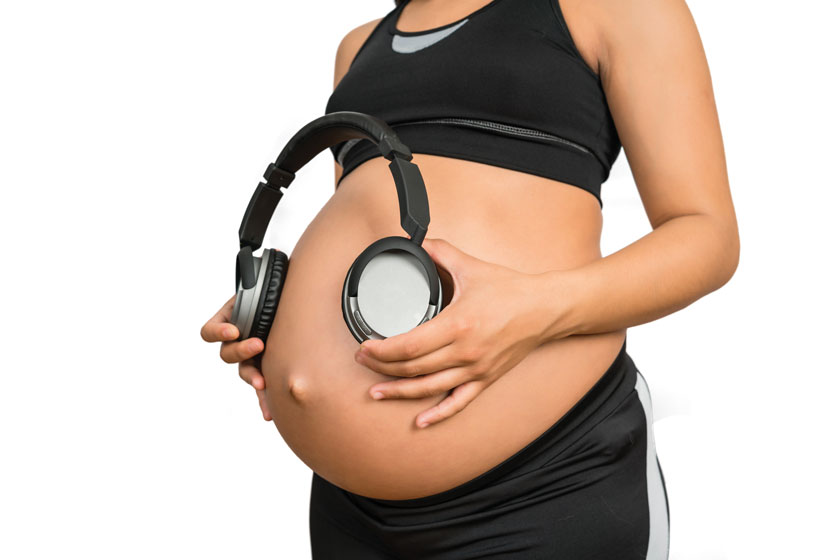Did you know that good habits, likes, dislikes, food preferences and much more start to develop while a baby is still in the mother’s womb? A growing number of researches, in fact, shows that pregnant women can successfully start teaching their baby certain things before their baby is even born! Read on…
It’s been a known fact for some time now, that babies start to pick up and learn a whole lot of stuff while still in their mother’s womb. They feel sensations such as gentle touches on the mother’s belly, and they can also hear sounds that are directed towards them. They end up liking or disliking the same foods as their moms too. Plus, it can be said that unborn babies also have shared emotions with their moms, feeling happy, sad, anxious or however else their mother is feeling. If you are pregnant, with this knowledge in hand, surely you’d want to pay extra attention from now on towards what goes on in your everyday life during pregnancy?
Your baby learns inside your womb in different ways. The three main areas of interest are as follows: Preferences, prenatal music and vocal interactions.
At around seven months gestation, your baby’s senses will be fully developed, with fully functioning olfactory receptors. Everything the mother is eating and tasting during this time will be accessible to her baby as well in terms of smells, tastes and flavours. Take note that if you are particularly fond of sweets, cakes and ice cream during pregnancy, and you consume these kinds of foods regularly enough, chances are high that your baby will develop a fondness for sweet foods too, and will seek them out during his or her lifetime. Savvy moms will instead take this opportunity to eat a good quality diet with lots of vegetables and fruits, and start hardwiring their baby’s dietary preferences during this delicate time so that their offspring will be more keen on a healthier diet in the future.
And now, what of music? It’s been found to help stimulate brain development in unborn babies. However, we don’t mean any kind of music though, mind you! The music genre that is said to assist in this area is mainly classical music, so bring out the Mozart and Beethoven CDs and let your baby have a listen everyday while he or she relaxes in your belly. Keep in mind that soothing, gentle and calm are the keywords here when it comes to prenatal music for your baby, so do stay away from loud or offbeat music or anything else that tends to be too extreme, for these may only serve to stress out your unborn child.
When we speak of vocal interactions, it’s a known fact that a baby is more likely to recognise his mother’s voice, which travels through her abdominal passages and reverberates through her amniotic fluids, thus reaching her little unborn child. This is very comforting for her baby, and it is important that the mother speaks in a sound sweet, gentle, caring and kind voice so that the baby has a fond yet distinctive memory of her voice. If you are pregnant, remember that the emotions you feel are shared with your foetus. When you cry, laugh or feel happy, your baby is introduced to those emotions and they affect how your baby feels. This translates to the expressions that they may exhibit on their faces after being born.
If you’re hoping to accelerate your baby’s learning and sensory development in your womb, here are some useful tips:
Speak gently, for your baby is listening! – Apart from deliberately talking to your bump, it will be an excellent idea to have storytime sessions, narrate events, experiences and fun things that are taking place around you, knowing that your little one pays attention to every word you send to your womb. This is especially so from the 27th week when the little one’s ear-brain connections have developed. Babies even respond to languages and accents in the womb which makes this the perfect time to keep speaking, in any language you know.
Have regular storytime sessions – What children’s story do you like to read? If you enjoy a story, chances are, your baby will too. Researchers found that regular reading triggered a preference for hearing stories out loud after birth which was demonstrated by babies increasing their sucking speed once they were born.
Exercise benefits your baby too! – Exercising has a way of making you feel good due to the release of endorphins, and guess what, your baby will feel good too! Furthermore, the effects last for up to 8 hours in the womb. Staying active improves blood circulation around your body and in the womb, thus increasing neuron cell growth in your baby’s hippocampus. This triggers learning and memory development and increases it by 40%. All the more reason to start moving that body, isn’t it?
Pay attention to what you eat – At around 12 weeks gestation, your baby’s taste buds would have developed, where else some forms of culinary preferences will start to show around the 25th week. Whatever a pregnant mom eats ultimately ends up in her baby’s body, and they also ‘flavour’ her amniotic fluid which the baby is in. Eat lots of nutritious foods and that’s what your baby will tend to like when he or she starts on solid foods. Consume more unhealthy stuff such as fried foods, desserts, soft drinks, etc, and your baby will tend to crave these foods later on in life! So… what will it be, mama?
Massage your belly – At around 20 weeks, your baby will start to sense when his mother’s belly is being touched or caressed. It is said that babies can even distinguish between their mom’s or their dad’s touch! By gently stroking your bump a few times a day, you will be sending calming signals to your baby, allowing them to feel loved and protected.
Whether you’re planning to get pregnant or if you’re pregnant already, either way, the best way to enhance your baby’s growth and development is to nurture it from inside the womb, one beneficial action at a time.




